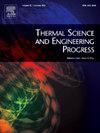6E evaluation of an innovative humidification dehumidification solar distiller unit: An experimental investigation
IF 5.1
3区 工程技术
Q2 ENERGY & FUELS
引用次数: 0
Abstract
This work aims to enhance the productivity, efficiency, energy utilization, feasibility, and environmental outcomes of solar desalination systems via representing an innovative humidification dehumidification solar distillation unit coupled with a built-in air solar heater and photovoltaic thermal unit. The air solar heater was further improved by the incorporation of copper chips as thermal energy-storing materials for extending the desalination process during the sun’s hours. Three distinct humidifier beds, including plastic waste (case A), wick materials (case B), and cellulose paper (case C) were tested and compared regarding system temperatures and hourly and daily drinkable water yield. Additionally, a 6E analysis was assessed and evaluated in terms of energy, exergy, economic, exergoeconomic, exergoenvironmental, and exergoenviroeconomic analysis for all the cases. According to the outcomes, the humidification dehumidification solar distiller with cellulose paper yielded the highest productivity and 6E outcomes where the daily drinkable water, thermal efficiency, and exergy efficiency were estimated as 7.78 L/m2, 73.45 %, and 5.3 %, outperforming the CSD by nearly 142.59 %, 144.02 %, and 229.19 %, respectively. Moreover, the price of drinkable water and the payback time decreased to 0.0099 $/L and 0.12 years, which represents a reduction of 68.27 % and 69.23 %, respectively, at an exergoeconomic factor of 4.19 kWh/$. Furthermore, the amount of CO2 reduced was increased to 3.92 tons, which is associated with earned credits of carbon of 56.78$. Finally, for this case, the HDH humidifier efficiency, dehumidifier effectiveness, and gain output ratio maximum and mean values were 96.66 and 84.5 %, 85.61 and 78.96 %, and 1.86 and 1.08, respectively.
6E 评估创新的加湿除湿太阳能蒸馏器装置:实验研究
这项研究旨在通过创新的加湿除湿太阳能蒸馏装置,结合内置的空气太阳能加热器和光伏热能装置,提高太阳能海水淡化系统的生产力、效率、能源利用率、可行性和环保效果。通过将铜片作为热能储存材料,进一步改进了空气太阳能加热器,以延长日照时间内的海水淡化过程。对三种不同的加湿器床进行了测试,包括塑料废料(情况 A)、灯芯材料(情况 B)和纤维素纸(情况 C),并就系统温度以及每小时和每天的饮用水产量进行了比较。此外,还从能源、放能、经济、排气经济、排气环境和排气环境经济分析等方面对所有情况进行了 6E 分析评估。结果表明,使用纤维素纸的加湿除湿太阳能蒸馏器的生产率和 6E 结果最高,每天的可饮用水、热效率和放能效估计分别为 7.78 L/m2、73.45 % 和 5.3 %,分别比 CSD 高出近 142.59 %、144.02 % 和 229.19 %。此外,饮用水价格和投资回收期分别降至 0.0099 美元/升和 0.12 年,按 4.19 千瓦时/美元的外部经济系数计算,分别降低了 68.27 % 和 69.23 %。此外,减少的二氧化碳量增加到 3.92 吨,获得的碳信用额为 56.78 美元。最后,在这种情况下,HDH 加湿器的效率、除湿器的效果和增益输出比的最大值和平均值分别为 96.66%和 84.5%、85.61%和 78.96%,以及 1.86%和 1.08%。
本文章由计算机程序翻译,如有差异,请以英文原文为准。
求助全文
约1分钟内获得全文
求助全文
来源期刊

Thermal Science and Engineering Progress
Chemical Engineering-Fluid Flow and Transfer Processes
CiteScore
7.20
自引率
10.40%
发文量
327
审稿时长
41 days
期刊介绍:
Thermal Science and Engineering Progress (TSEP) publishes original, high-quality research articles that span activities ranging from fundamental scientific research and discussion of the more controversial thermodynamic theories, to developments in thermal engineering that are in many instances examples of the way scientists and engineers are addressing the challenges facing a growing population – smart cities and global warming – maximising thermodynamic efficiencies and minimising all heat losses. It is intended that these will be of current relevance and interest to industry, academia and other practitioners. It is evident that many specialised journals in thermal and, to some extent, in fluid disciplines tend to focus on topics that can be classified as fundamental in nature, or are ‘applied’ and near-market. Thermal Science and Engineering Progress will bridge the gap between these two areas, allowing authors to make an easy choice, should they or a journal editor feel that their papers are ‘out of scope’ when considering other journals. The range of topics covered by Thermal Science and Engineering Progress addresses the rapid rate of development being made in thermal transfer processes as they affect traditional fields, and important growth in the topical research areas of aerospace, thermal biological and medical systems, electronics and nano-technologies, renewable energy systems, food production (including agriculture), and the need to minimise man-made thermal impacts on climate change. Review articles on appropriate topics for TSEP are encouraged, although until TSEP is fully established, these will be limited in number. Before submitting such articles, please contact one of the Editors, or a member of the Editorial Advisory Board with an outline of your proposal and your expertise in the area of your review.
 求助内容:
求助内容: 应助结果提醒方式:
应助结果提醒方式:


